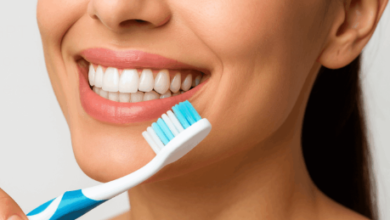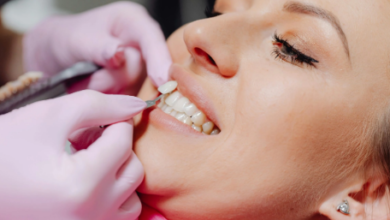Finding a Reliable Emergency Dentist in Edmonton When You Need One Most

Understanding Dental Emergencies in Edmonton
Dental emergencies can be scary, and knowing what constitutes one is super important. It’s not just about pain; it’s about potentially serious issues that need quick attention. Finding a reliable emergency dentist in Edmonton, especially one experienced in family dentistry, can make all the difference.
Recognizing Urgent Dental Conditions
So, what exactly counts as a dental emergency? Here are a few things to watch out for:
- Severe Toothache: A toothache that’s so bad you can barely function? Yeah, that’s an emergency. Especially if it’s accompanied by swelling or fever.
- Knocked-Out Tooth: This one’s pretty obvious. Time is of the essence to try and save the tooth.
- Abscess: A painful, pus-filled pocket in your gums. This can indicate a serious infection that needs immediate treatment.
- Broken or Cracked Tooth: If the damage is severe and causing significant pain, it’s an emergency.
When Immediate Care is Essential
Not every dental issue requires a mad dash to the dentist, but some do. Here’s when you need to act fast:
- Uncontrolled Bleeding: Bleeding in your mouth that won’t stop after applying pressure for a reasonable amount of time.
- Trauma to the Face or Mouth: Any significant injury to your face or mouth, especially if it involves teeth.
- Difficulty Breathing or Swallowing: This could indicate a serious infection or allergic reaction.
Preventing Further Complications
Ignoring a dental emergency can lead to some pretty nasty consequences. Think about it:
- Infection Spread: A dental infection can spread to other parts of your body, leading to serious health problems.
- Tooth Loss: Delaying treatment for a knocked-out or severely damaged tooth can make it impossible to save.
- Chronic Pain: Untreated dental issues can lead to long-term pain and discomfort.
- Increased Treatment Costs: The longer you wait, the more extensive (and expensive) the treatment is likely to be.
Finding a Same-Day Emergency Dentist in Edmonton
When a dental emergency strikes, you need help fast. Finding a same-day emergency dentist in Edmonton can feel overwhelming, but it’s doable if you know where to look. Don’t panic; here’s how to get started.
Leveraging Online Search Tools
Okay, first things first: the internet is your friend. Start with a quick search using terms like “emergency dentist Edmonton same day” or “walk-in dentist Edmonton.” But don’t just stop there. Dig a little deeper.
- Google Maps is clutch: Type in “emergency dental clinic” and see what pops up nearby. Check their hours and read a few reviews to get a feel for the place.
- Use specific keywords: Instead of just “dentist,” try adding details about your specific issue, like “broken tooth” or “severe toothache.” This can help you find clinics that specialize in what you need.
- Don’t forget directories: Websites like Yelp or even the Yellow Pages (yes, they still exist online!) can list local dentists with emergency services. Just make sure the info is up-to-date.
Checking Dental Clinic Websites for Emergency Services
Once you’ve got a list of potential clinics from your search, head straight to their websites. Most dentists these days have pretty informative sites. Look for these key things:
- Emergency dental care pages: Many clinics have a dedicated page outlining their emergency services, hours, and contact info. This is gold.
- Online booking options: Some clinics let you book emergency appointments directly through their website. This can save you time and hassle.
- After-hours contact info: If it’s late at night or on the weekend, see if they have an emergency contact number listed. It’s usually a separate line from their regular office number.
Contacting Clinics Directly for Availability
Alright, you’ve done your online research. Now it’s time to pick up the phone. Calling clinics directly is often the fastest way to find out if they can see you ASAP. Here’s what to do:
- Be clear about your situation: Explain your dental emergency in detail. The more info you give, the better they can assess your needs.
- Ask about same-day appointments: Straight up ask if they have any openings for emergency patients that day. Don’t beat around the bush.
- Inquire about costs: Emergency dental care can be pricey, so ask about their fees and payment options upfront. It’s better to know what you’re getting into before you go.
Key Considerations for Choosing an Emergency Dentist in Edmonton
Finding the right emergency dentist in Edmonton can feel overwhelming when you’re already dealing with pain or anxiety. But don’t worry, it’s doable! When facing a dental crisis, remember that finding a reliable emergency dentist is paramount. Here’s what I think you should keep in mind:
Assessing Clinic Reputation Through Reviews
First things first, check out what other people are saying. Online reviews can be super helpful in getting a feel for a clinic’s reputation. Look for patterns – are people consistently praising the dentist’s bedside manner? Are there multiple complaints about long wait times or high costs? A few things to consider:
- Read a variety of reviews: Don’t just focus on the most recent ones. Look at reviews from different periods to get a balanced perspective.
- Pay attention to specific details: Vague reviews like “Great service!” aren’t as helpful as reviews that mention specific procedures or experiences.
- Consider the source: Be aware that some reviews might be fake or biased. Look for reviews on reputable platforms like Google, Yelp, or Facebook.
Evaluating Proximity and Accessibility
When you’re in pain, the last thing you want is a long drive. Think about how close the clinic is to your home or work. Also, consider things like:
- Traffic: Edmonton traffic can be a beast, so factor that in when estimating travel time.
- Parking: Is there easy parking available at the clinic? Street parking can be a nightmare.
- Public transportation: If you don’t drive, is the clinic easily accessible by bus or train?
Confirming Weekend and Holiday Availability
Dental emergencies don’t always happen during regular business hours. Make sure the clinic you choose offers weekend and holiday appointments. Some things to ask about:
- Specific hours: What are their exact hours on weekends and holidays?
- On-call dentists: Do they have a dentist on call for emergencies outside of regular hours?
- Additional fees: Are there extra charges for weekend or holiday appointments?
Preparing for Your Emergency Dental Visit in Edmonton
So, you’ve got a dental emergency and you’re heading to the dentist in Edmonton. Good move! But before you rush out the door, there are a few things you can do to make the visit smoother and more effective. Preparing for your emergency dental visit in Edmonton can help the dentist get you sorted out faster and with less hassle. Here’s what I usually try to remember:
Gathering Essential Dental Records
If you’ve got them, bring along any relevant dental records. I know, it sounds like a pain, but it can seriously help the dentist understand your history. This includes:
- Past treatment information: Any notes on previous fillings, root canals, or other procedures? This gives the dentist a heads-up on what’s been done before.
- X-rays: Recent X-rays are super useful. They show what’s going on beneath the surface and can help diagnose problems quickly. If you’ve had X-rays taken recently, call your regular dentist and see if they can forward them.
- Referral letters: If another dentist or doctor referred you, bring that letter along. It provides context and specific concerns that were already identified.
Having Insurance Information Ready
Let’s face it, dental work can be expensive. Having your insurance info ready can save time and stress later. Make sure you have:
- Your insurance card: Obvious, but easy to forget in a panic. Keep it in your wallet or take a picture of it on your phone.
- Policy details: Know your policy number, group number, and any limitations or exclusions. This helps the clinic verify your coverage quickly.
- Pre-authorization information: If you know you need a major procedure, check if it requires pre-authorization from your insurance company. Getting this sorted beforehand can prevent billing surprises.
Listing Current Medications for the Dentist
It’s super important for the dentist to know what medications you’re currently taking. This can affect the treatment plan and prevent any adverse reactions. Be sure to include:
- Prescription medications: List all prescription drugs, including dosages and frequency.
- Over-the-counter drugs: Don’t forget about those pain relievers, vitamins, and supplements you take regularly.
- Allergies: Make a note of any allergies, especially to medications, latex, or other substances used in dental procedures. This is important for your safety.
What to Expect During an Emergency Dental Appointment in Edmonton
So, you’ve found an emergency dentist in Edmonton – that’s great! But what happens next? Knowing what to expect can ease your anxiety. The whole process is designed to get you out of pain and on the road to recovery as quickly as possible. Let’s walk through what usually happens during an emergency dental appointment.
Initial Assessment and Diagnosis
First things first, the dentist will need to figure out what’s going on. This usually involves:
- A Quick Chat: They’ll ask you about your dental history, what happened, and where it hurts. Be as specific as you can – it helps them narrow things down.
- Visual Examination: They’ll take a good look inside your mouth to see the problem firsthand. This might involve poking around a bit, but they’ll try to be gentle.
- X-rays (Maybe): Depending on the situation, they might need to take X-rays to see what’s happening beneath the surface. This is super common for things like infections or hidden cracks.
Pain Management and Immediate Relief
Let’s be real, you’re probably in pain. Getting you some relief is a top priority. Here’s how they might tackle it:
- Local Anesthetic: This is the go-to for numbing the area. It’s a quick shot that makes the rest of the treatment much more bearable.
- Pain Medication: If the pain is really bad, they might prescribe something stronger to take at home. Just be sure to follow their instructions carefully.
- Temporary Fixes: Sometimes, they can do a quick fix to ease the pain right away. This could be something like smoothing a sharp edge or applying a temporary filling.
Developing a Comprehensive Treatment Plan
Once the immediate crisis is under control, the dentist will lay out a plan for fixing the problem for good. This includes:
- Explaining the Options: They’ll walk you through the different ways to solve the issue, along with the pros and cons of each.
- Setting Expectations: They’ll give you a realistic idea of how long the treatment will take and how much it will cost. No surprises, hopefully!
- Scheduling Follow-Up Appointments: Depending on the situation, you might need to come back for more work. They’ll get those appointments booked before you leave. Remember, prompt intervention is key to saving a tooth!
Cost and Payment Options for Emergency Dental Care in Edmonton
Let’s be honest, when you’re in pain, the last thing you want to worry about is cost. But understanding the financial side of emergency dental care is essential, especially for those seeking family dentistry in Edmonton. Unexpected dental issues can disrupt your budget, so being prepared can make a big difference. In this section, we’ll break down typical costs, insurance coverage, and flexible payment options to help ensure you and your family aren’t caught off guard.
Understanding Emergency Service Fees
Emergency dental services often come with higher fees than regular check-ups. Why? Well, it’s because dentists need to be available outside of normal business hours, and they often have to rearrange their schedules to accommodate urgent cases. Here’s what you should keep in mind:
- Initial Consultation Fees: Expect to pay a fee just for the dentist to assess your situation. This covers their time and expertise in diagnosing the problem.
- Treatment Costs: The actual treatment will, of course, add to the bill. A simple filling will cost less than a root canal or extraction.
- After-Hours Surcharges: If you need to see a dentist on a weekend, holiday, or late at night, be prepared for an extra charge. It’s just the nature of the beast.
Discussing Dental Insurance Coverage
Dental insurance can be a lifesaver, but it’s crucial to know what your plan covers before you’re sitting in the dentist’s chair. Here’s the lowdown:
- Check Your Policy: Call your insurance provider and ask specifically about emergency dental coverage. Find out what percentage they cover, what the annual maximum is, and if there are any waiting periods.
- Pre-Approval: Some procedures might require pre-approval from your insurance company. It’s a good idea to get this sorted out beforehand if possible, but in an emergency, that might not be feasible.
- Direct Billing: Ask if the dental clinic offers direct billing to your insurance company. This can save you a lot of hassle and paperwork.
Exploring Affordable Payment Solutions
What if you don’t have insurance, or your insurance doesn’t cover the full cost? Don’t panic! There are still options:
- Payment Plans: Many dental clinics offer payment plans that allow you to spread out the cost of treatment over several months. This can make things much more manageable.
- Credit Cards: While not ideal, using a credit card can be a way to cover the immediate cost of treatment. Just be sure to pay it off as quickly as possible to avoid racking up interest charges.
- Dental Financing: Some companies specialize in providing financing for dental procedures. These loans often come with lower interest rates than credit cards.
- Community Programs: Look into local community dental programs or charities that offer reduced-cost dental care to those who qualify. Alberta Blue Cross and the Alberta Dental Service Corporation (ADSC) are worth checking out for potential coverage options if you’re uninsured.
Maintaining Oral Health to Minimize Dental Emergencies in Edmonton
While you can’t predict every accident, a lot of dental emergencies in Edmonton can be avoided with some consistent effort. Think of it like car maintenance – a little now can save you from a breakdown later. Let’s talk about how to keep your smile strong and healthy.
Practicing Consistent Oral Hygiene
This is the big one, and it’s not just about brushing before bed. It’s a daily commitment. Here’s what I try to do:
- Brush twice a day: Morning and night, no excuses. Use fluoride toothpaste and get all the surfaces of your teeth. Two minutes is the recommended time, but honestly, I usually go until I feel like I’ve gotten everything.
- Floss daily: I know, I know, everyone hates flossing. But it gets the stuff your toothbrush misses. Do it before you brush at night so the fluoride in your toothpaste can get in there. I keep floss picks in my car and desk so I can floss on the go.
- Use mouthwash: It helps kill bacteria and freshens your breath. I like the ones with fluoride for extra protection. Just don’t swallow it!
Wearing Protective Gear During Activities
If you’re into sports or anything where your mouth might take a hit, get a mouthguard. Seriously. It’s way cheaper than fixing a broken tooth. I learned that the hard way.
- Custom-fitted mouthguards: These are the best because they fit your mouth perfectly. Your dentist can make one for you.
- Boil-and-bite mouthguards: You can buy these at most drugstores. You heat them in hot water and then bite down on them to mold them to your teeth. They’re not as good as custom ones, but they’re better than nothing.
- Wear a helmet: If you’re biking, skateboarding, or doing anything where you might fall and hit your face, wear a helmet. It protects your head and your jaw.
Scheduling Regular Dental Check-Ups
Don’t wait until something hurts to see your dentist. Regular check-ups are key to catching problems early. I try to go every six months, but at least once a year is a must.
- Professional cleanings: The hygienist can remove plaque and tartar that you can’t get rid of at home. Plus, they can spot potential problems.
- X-rays: These can show problems that aren’t visible to the naked eye, like cavities between your teeth or bone loss.
- Early detection: Catching problems early means they’re easier and cheaper to fix. A small cavity is way better than a root canal, trust me.




